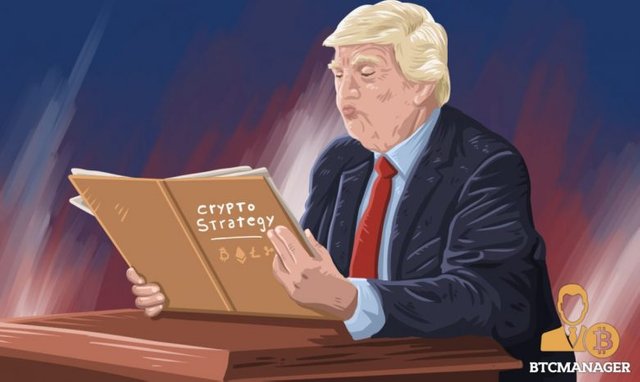Cryptocurrency Strategy Being Worked on By Trump Administration

For a long time now, the crypto community has been waiting to see what sort of approach the United States government will take when it comes to digital currencies. With the explosion in popularity of bitcoin and other digital currencies in 2017, breaching the mainstream, this is a topic that can no longer be ignored by centralized governments.
To date, there have been mixed feelings by nations as to the benefits of digital currencies. Some see them as a threat to their monetary system and as being a way for criminals to carry out their activities in a more secure manner, while other countries are embracing the change.
There have been a number of countries that have launched a national digital token or are in the planning phases of doing so.
The growth of this sector took policymakers largely by surprise, so they have been playing catch-up when it comes to putting in place relevant laws and regulations for the industry.
Deputy Attorney General Speaks on Crypto
It was on Tuesday, February 27 that the United States Deputy Attorney General Rod Rosenstein was speaking at the spring conference for the Financial Services Roundtable in which he outlined what sort of approach the current administration would be taking when it comes to cryptocurrency.
It was during the Q&A towards the end of his speaking allotted time that a member of the audience asked him about what he thought of both cybercrime and cryptocurrency.
He started his response by referring to the cybercrime portion of the question, and he noted that there was a new task force setup up in the third week of February 2018 that will be focused on creating strategies for dealing with tech-related crime. This task force was set up by the Justice Department.
He made the link between cybercrime and the use of cryptocurrencies by these criminals in order to stay as anonymous as possible. Of course, one of the advantages of using digital currencies is that users can stay largely anonymous, as there will be no definitive paper trail that can lead to a certain individual or group if they are careful, unlike the traditional finance system.
An Effort to Understand the Cybercrime and Crypto Linkage
He noted that one of the areas of focus for the cybercrime task force would be figuring out ways in which they can deal with criminals using cryptocurrencies as part of their activities.
This task force is made up of people from different government agencies, such as the Drug Enforcement Agency, US Marshals Service, and the FBI.
Rosenstein did highlight that most emerging technologies will have early adopters with criminal intent. He is effectively saying that not everyone using cryptocurrencies should be labeled as being a criminal just because there are a few bad eggs.
The Deputy Attorney General went on to discuss how criminals are not able to remain completely anonymous throughout the process of using digital currencies. Eventually, he says these people will want to transfer these cryptocurrencies into fiat currency, and there are ways in which they can be caught by using a variety of techniques that the task force will be trained in.
Finally, he noted how the government needs to ensure that they have people with the best expertise and that they are always up to date with the latest development in the crypto and cybercrime sectors. It is also imperative that these people are not poached by financial companies who also need their expertise.